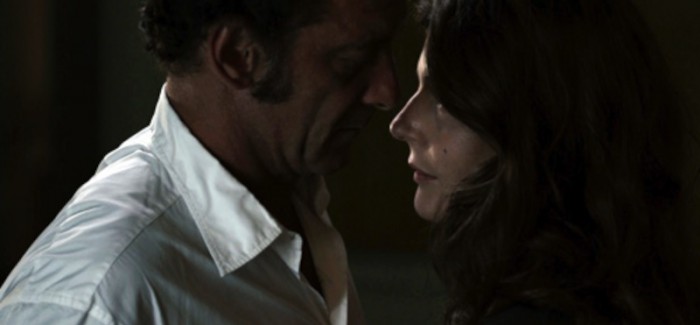VOD film review: Bastards
Review Overview
Oh my god!
8You bastards!
6Simon Kinnear | On 20, Feb 2014
Director: Claire Denis
Cast: Vincent Lindon, Chiara Mastroianni, Julie Bataille
Certificate: 15
Watch online: Curzon Home Cinema / BFI Player / Apple TV (iTunes) / Amazon Instant Video
Since her last film (the complex, gripping post-colonial drama White Material), the stock of French director Claire Denis has risen astronomically. In 2012, the decennial Sight And Sound critics’ poll of the best films ever made placed Denis’ Beau Travail at 78= (tied with Chinatown), making it the second highest placed film directed by a woman, and the fourth most recent film in the top 100. It felt as if Denis had finally achieved her place as one of the world’s greatest directors…
… Until her new film, Bastards, was notoriously shunted out of the official competition at last year’s Cannes, thrown instead to the second-tier Cinema De Regard. It’s not what you’d expect of one of the world’s best directors, so what gives?
Well, quite possibly it’s because Bastards is one of the bleakest, most disquieting films produced by a critical darling for a long time. The confrontational title hints that Denis isn’t a happy bunny, and sure enough Bastards is a work of excoriating pessimism. Elements of the plot recalls Get Carter (there are also shades of Chinatown, funnily enough) but it makes those famously cold-hearted classics look like sweetness and light in comparison.
This is the story of Marco Silvestri (Lindon), a ship captain who returns to shore following the mysterious suicide of his brother-in-law. His sister blames businessman Edouard Laporte (Subor), and so Marco stations himself in the building as the suspect’s mistress, Raphaëlle (Chiara Mastroianni). The stage is set for a standard revenge thriller, until you start to wonder why Marco would rather live his life at sea than spend any time with his family.
If the above synopsis sounds conventional enough, it’s a storyline that has to be pieced together retrospectively. The more impatient of viewers might be tempted to hit pause on VOD and scurry off to the IMDb to figure out what’s going on. Denis makes zero concession to basic cause-and-effect; her elliptical style eels as though several scenes of crucial exposition have been chopped out of the narrative, or that the order of events has been interfered with.
In the place of clarity comes an unusual focus on atmosphere – at first, it’s frustrating, until you find yourself leaning in, trying to decipher the visual, narrative and thematic murk. For those that can brave the confusion, Denis rewards (or, rather, punishes) our interest with a baleful study of unchecked corruption and cruelty. The official synopsis claims that this is a study of modern-day capitalism, and Denis has explained that the rape case involving financier Dominique Strauss-Kahn was her chief inspiration. Of course, the message might be even simpler and more universal than that: people are bastards.
The imagery is visceral – a leather bed stained with semen, coughed-up blood spurting towards a plughole, and an inexplicably sinister, rotting corncob. Similarly, we’re shown plenty of body but little soul, and her stark close-ups offer little comfort. Faces are either near-catatonic innocents like Lola Creton’s teen victim; eerily Identikit women (it takes a while to ascertain that the sister and the mistress are two separate characters); or worn-out, ennui-stricken roadmaps of sadness like Lindon’s self-loathing hero. Hovering over everyone is the ashen-faced, rictus-wearing Subor, quite possibly the creepiest old man in cinema since Robert Blake in Lost Highway.
All the while, Denis is leading us to the implications of a genuinely chilling ending, in a film that underlines her artistic predominance even as it gives Sight and Sound cause to wonder what kind of killjoy they’ve permitted to gatecrash the party of the greats.


















